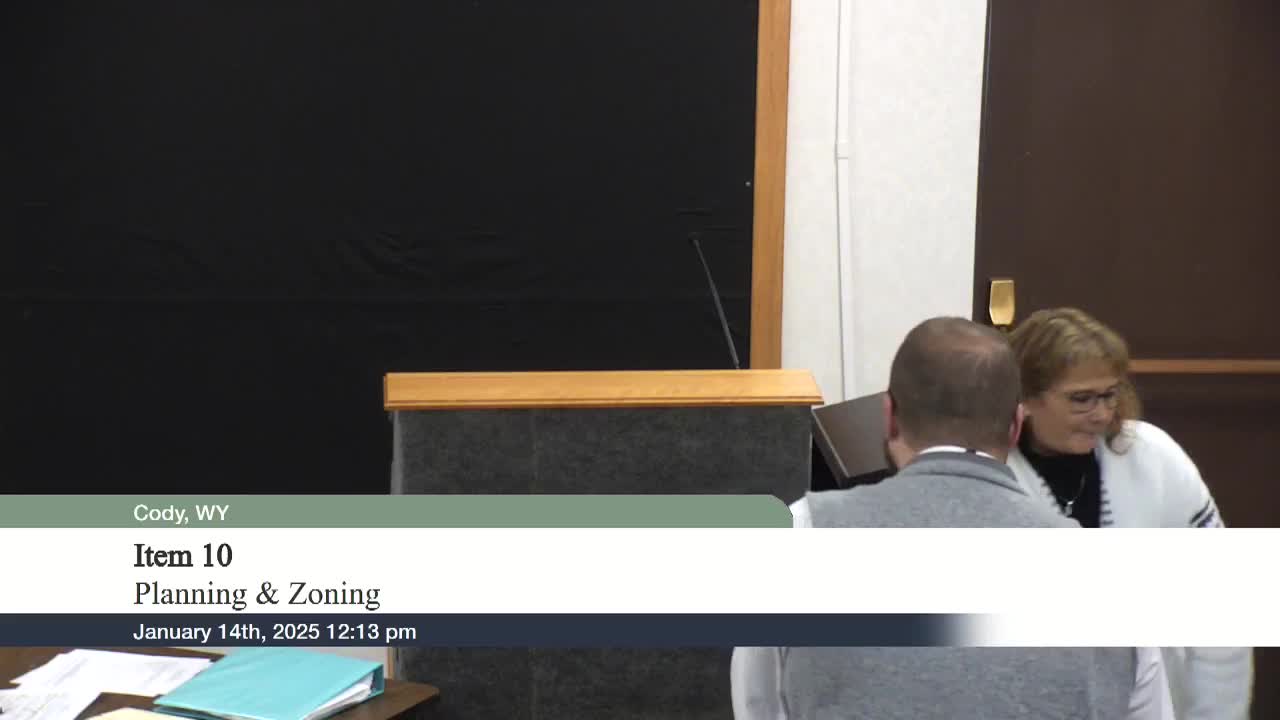Cody planning board gets refresher on zoning authority, public‑records and conflict rules; officers elected
Get AI-powered insights, summaries, and transcripts
Subscribe
Summary
At its Jan. 14 meeting the City of Cody Planning and Adjustment Board received legal and procedural training from Kopecky and IT guidance from Scott Kitchen; the board elected Dan Shine as chair and Ian Morrison as vice chair and approved minutes from Dec. 10, 2024.
The City of Cody Planning and Adjustment Board met Jan. 14 and received a multi-part training on the board’s legal authority, applicable sections of the municipal code, public‑records/open‑meetings rules and conflict‑of‑interest standards, followed by an information briefing on city email and mobile access. The board also elected Dan Shine chair and Ian Morrison vice chair and approved corrected minutes from the Dec. 10, 2024 meeting.
The training was presented by Kopecky, who reviewed the board’s roles as both the planning and zoning commission and the board of adjustment, the primary sections of the City of Cody municipal code board members should use, and the legal standards that must support land‑use decisions. Kopecky told members they should rely on the evidentiary record and staff materials when deciding conditional uses, special exemptions or variances: "Your decision has to be based on what is called the record," he said.
Kopecky emphasized that Title 10 of the municipal code is the city zoning code and that Title 9 covers construction standards (including a commercial site‑plan review requirement cited as 9‑2‑3 and a fence approval provision for fences exceeding seven feet at 9‑4‑1) while Title 11 governs subdivisions. He explained that some items before the board are recommendations to city council and others are final administrative decisions, and that the board must distinguish when it is acting in its planning/zoning role and when it is functioning as a board of adjustment.
Kopecky reviewed statutory and procedural limits on decision making. He summarized the Wyoming Administrative Procedure Act standard that a board’s determinations should be supported by substantial evidence and cautioned against basing votes on outside reports or rumor. He cited a Wyoming Supreme Court decision from 1997 (a remand of a Casper planning decision discussed in the training) as an example of a court overturning a commission decision that the court found unsupported by the record.
The presentation covered open‑meetings and public‑records obligations: most planning emails and written communications sent using city accounts are public records, and substantive deliberations among a quorum may not be conducted by email, text or other electronic means that exclude public observation. Kopecky warned that even inadvertent group gatherings that constitute a quorum can create the perception of a prohibited meeting and urged members to avoid substantive group electronic discussions. He also reviewed the narrow statutory definition of a "personal or private interest" that triggers an abstention and described routine steps for disclosing and recording an abstention.
Following the legal briefing, Scott Kitchen of the city IT department described practical steps for accessing the City of Cody Google Workspace email accounts, two‑step verification requirements, and the option to sync email to a personal mobile device. Kitchen said syncing mobile devices will create a separated “work profile” and that certain basic device controls (encryption, lock screen, system information visible to IT) will apply if members choose to sync city email to personal devices.
Utahana, a city staff member, and Kopecky confirmed the board will receive the training materials and links: the zoning ordinance, subdivision ordinance, a building code pamphlet, and the city master plan will be made available in PDF form for members to consult before future hearings.
Votes at a glance: Dan Shine was elected chair for 2025 (motion carried); Ian Morrison was elected vice chair for 2025 (motion carried, recorded as unanimous); the board approved the corrected minutes of Dec. 10, 2024 (motion carried); the meeting was adjourned by motion.
The training underscores the legal and procedural obligations planners and board members must follow when reviewing development proposals. Staff said the materials and code links will be circulated to help new and returning members prepare for future agenda items.
